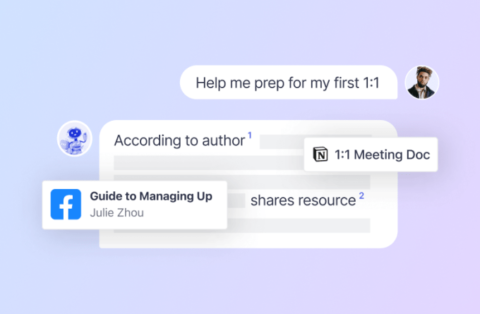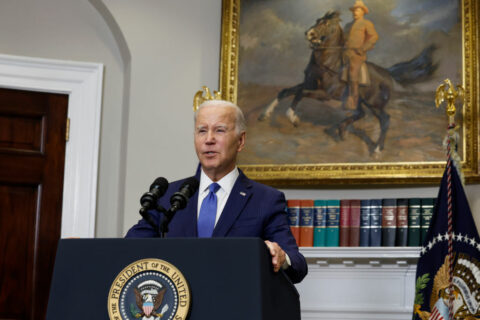Can an AI be your mentor? That’s what a startup called Practica believes. The company, which evolved out of a marketplace for one-on-one executive coaching, has now launched […]
Welcome back to the SaaS bear market
The good news for startups is that growth premiums are coming back Alex Wilhelm 9 hours How are software companies performing today? It’s going to be a busy […]
Understanding operations intelligence can transform a startup
Amitai Gilad Contributor Amitai Gilad is the Vice President of Data at Akooda. With more than 15 years of experience in engineering and R&D management within the governmental […]
Facebook and Instagram launch ad-free subscription in Europe
Meta now offers users in the EU, EEA, and Switzerland a monthly subscription fee to use Facebook and Instagram without ads.

It’s not particularly surprising, but it is pretty exciting: In a decision that could change the way we interact with social media companies, Meta is offering a monthly subscription fee to use Facebook and Instagram without any ads for users in the EU, EEA, and Switzerland.
Beginning in November, users will be able to pay €9.99 per month on the web or €12.99 per month on iOS and Android to use Facebook or Instagram without ads, and, while subscribed, their information will not be used for ads. It’s more expensive on iOS and Android because of the app store fees, Meta said in a statement. The subscription will apply to all of your accounts until March 1, 2024 — so if you have a public Instagram account and a finsta, both will be covered under your subscription.
After March 1, 2024, you’ll have to pay an additional €6 per month on the web and €8 per month on iOS and Android for each additional account. There will still be the option to use the services for free and continue to see ads.
“We believe in an ad-supported internet, which gives people access to personalized products and services regardless of their economic status,” Meta said in a statement. “It also allows small businesses to reach potential customers, grow their business, and create new markets, driving growth in the European economy. And like other companies, we’ll continue to advocate for an ad-supported internet, even with our new subscription offering in the EU, EEA, and Switzerland. But we respect the spirit and purpose of these evolving European regulations, and are committed to complying with them.”
Social media runs on ads — we know this. If Meta can keep you on its platform longer, you’ll see more ads, paying Meta more money, and the cycle continues. Ads likely make Meta more money than a subscription fee ever could, so it’s clear that this change was born from a fight between Meta and legislators, not just a kindness from the social media giant.
This comes amid a years-long battle between EU regulators and Meta due to the company’s data collection practices and the EU’s GDPR, a 2016 law that protects people’s online privacy and data.
Meta to offer ad-free subscription in Europe in bid to keep tracking other users
Meta is to offer an ad-free subscription version of Facebook and Instagram in the European Union, EEA (European Economic Area) and Switzerland, confirming the core of a report […]
President Biden issues executive order to set standards for AI safety and security
U.S. President Joe Biden has issued an executive order (EO) that seeks to establish “new standards” for AI safety and security, including requirements for companies developing foundation AI […]
ChatGPT can now analyze documents including PDFs
A ChatGPT update brings several important new features, including the ability to upload documents and have them analyzed.

OpenAI’s ChatGPT is getting an important update that allows users to upload documents and have them analyzed.
The new version, currently in beta and rolling out to some ChatGPT Plus subscribers (@luokai via The Verge), give users the ability to upload many types of documents, including PDFs or data files.
I was able to test the chatbot’s new feature myself, by turning on beta features in the settings, and then choosing “Advanced data analysis,” which allows for file uploads and gives ChatGPT the ability to write and execute python code. I first tried uploading Shakespeare’s Macbeth in PDF format, though ChatGPT couldn’t analyse the file due to its formatting (it did, however, recognize the play, and it offered to give me a summary of it anyways). I also tried with a scholarly article on the economic impact of melting ice caps; ChatGPT analyzed the file, and provided bulleted key points, as well as a number of additional insights, rounding it up with a comprehensive summary of the document.
This functionality can be incredibly powerful in certain situations, as you can now feed ChatGPT specific documents and have it extract summaries, various data points, or even write graphs and charts based on that data.
It’s worth noting that ChatGPT’s creator OpenAI has already landed in hot water for training its models on copyrighted work. Anyone using ChatGPT to analyze documents should be mindful of which documents they use, and even more so, how they use ChatGPT’s results.
ChatGPT’s new beta also has a feature that makes it easier to use, as it automatically switches between various modes of operation, including Browsing, DALL-E, and Advanced Data Analysis. This was not enabled for me, but it definitely sounds better than having to choose the specific tool you want to use every time you fire up ChatGPT.
While some ChatGPT Plus subscribers can try these new features out right now, there’s no word on when these features might become available to everyone.
The White House announces an executive order on AI regulation — how ChatGPT and its ilk are affected
The White House just announced an executive order on AI regulation, which means major players like Open AI, Google, Microsoft and other prominent AI players must abide by the new legislation.

The White House just announced a thunderous executive order tackling AI regulation. These directives are the “strongest set of actions any government in the world has ever taken” to protect how AI affects American citizens, according to White House Deputy Chief of Staff Bruce Reed.
The Biden administration has been working on plans to regulate the untethered AI industry. The order builds on the Biden-Harris blueprint for an AI Bill of Rights as well as voluntary commitments from 15 leading tech companies to work with the government for safe and responsible AI development.
Instead of waiting for Congress to pass its own legislation, the White House is storming ahead with an executive order to mitigate AI risks while capitalizing on its potential. With the widespread use of generative AI like ChatGPT, the urgency to harness AI is real.
White House AI executive order: 10 key provisions you need to know
What does the executive order look like? And how will it affect AI companies? Here’s what you need to know.
1. Developers of powerful AI systems (e.g., OpenAI, Google and Microsoft) must share the results of their safety tests with the federal government
In other words, while a prominent AI company is training its model, it is required to share the results of red-team safety tests before they are released to the public. (A red team is a group of people that test the security and safety of a digital entity by posing as malicious actors.)
According to a senior administration official, the order focuses on future generations of AI models, not current consumer-facing tools like ChatGPT. Furthermore, companies that would be required to share safety results are those that meet the highest threshold of computing performance. “[The threshold] is not going to catch AI systems trained by graduate students or even professors. This is really catching the most powerful systems in the world,” said the official.
2. Red-team testing will be held to high standards set by the National Institute of Standards and Technology
Homeland Security and the Departments of Energy will also work together to determine whether AI systems pose certain risks in the realm of cybersecurity as well as our chemical, biological, radiological, and nuclear infrastructure.
3. Address the safety of AI players using models for science and biology-related projects
New standards for “biosynthesis screening” are in the works to protect against “dangerous biological materials” engineered by AI.
4. AI-generated content must be watermarked
The Department of Commerce will roll out guidance for ensuring all AI-generated content — audio, imagery, video, and text — is labeled as such. This will allow Americans to determine which content is created by a non-human entity, making it easier to identify deceptive deepfakes.
5. Continue building upon the ‘AI Cyber Challenge’
For the uninitiated, the AI Cyber Challenge is a Biden administration initiative that seeks to establish a high-level cybersecurity program that strengthens the security of AI tools, ensuring that vulnerabilities are fixed.
6. Lean on Congress to pass “bipartisan data privacy legislation”
The executive order is a message to Congress to speed things up. Biden is calling on lawmakers to ensure that Americans’ privacy is protected while prominent AI players train their models. Children’s privacy will be a primary focus.
7. Dig into companies’ data policies.
The White House says that it will evaluate how agencies and third-party data brokers collect and use “commercially available” information, meaning public datasets. Some “personally identifiable” data is available to the public, but that doesn’t mean AI players have free rein to use this information.
8. Tamp down on discrimination exacerbated by AI
Guidance will be rolled out to landlords, federal contractors, and more to reduce the possibility of bias. On top of that, the government will introduce best practices to address discrimination in AI algorithms. Plus, the Biden administration will address the usage of AI in sentencing regarding the criminal justice system.
9. Attract top global talent
As of today, the ai.gov site has a portal for applicants seeking AI fellowships and job opportunities in the U.S. government. The order also seeks to update visa criteria for immigrants with AI expertise.
10. Support workers vulnerable to AI developments
The Biden administration will support workers’ collective bargaining influence by developing principles and best practices to protect workers against potential harms like surveillance, job replacement, and discrimination. The order also announced plans to produce a report on AI’s potential for disrupting labor markets.
Mashable will be down in D.C. to get more information about how the new AI executive order will affect major players like Open AI, Google, and Microsoft as well as the average American citizen. Stay tuned for our coverage on this matter.
Twitter / X posts with misinformation are no longer eligible for ad revenue sharing
Twitter / X owner Elon Musk has announced it is disabling ad revenue sharing on posts which are corrected by Community Notes fact checks.

Twitter / X owner and executioner Elon Musk has announced that the platform is disabling ad revenue sharing on posts which are corrected by Community Notes fact checks. The aim is to make sharing incendiary false information on Twitter / X less obviously and immediately profitable.
“Any posts that are corrected by @CommunityNotes become ineligible for revenue share,” Musk wrote on his official account on Sunday. “The idea is to maximize the incentive for accuracy over sensationalism.”
Implemented earlier this year, Twitter / X’s ad revenue sharing program gives users a cut of the income from ads shown in the replies to their posts. The program is only available to users with a paid X Premium or Verified Organization account, and they must also have at least 500 followers as well as a minimum of 5 million organic impressions in total across all their posts within the last three months.
Unfortunately, it’s widely believed that social media posts are more likely to go viral if they are divisive, polarising, negative, or include misinformation. So if you were aiming to maximise your potential Twitter / X ad revenue earnings prior to today, you were essentially incentivised to make posts which included such content.
Having specific posts ineligible for ad revenue still won’t stop verified accounts from continuing to peddle misinformation, but at least they’ll have one less reason to do so.
Musk also attempted to address the possibility of people abusing Twitter / X’s new policy by using Community Notes’ crowd-sourced content moderation with the intent to restrict an account’s potential ad revenue.
“Worth ‘noting’ that any attempts to weaponize @CommunityNotes to demonetize people will be immediately obvious, because all code and data is open source,” Musk claimed.
It’s unclear exactly whether such data transparency will actually prevent people from applying Community Notes to strategically demonetise accounts, or whether it will simply be apparent when they do.
Interestingly, Musk did not mention any intention to disable ads on posts that have been corrected by Community Notes, making this new policy seem like a win-win for Twitter / X. While the company will no longer explicitly reward users who spread mis- or disinformation, it will presumably still reap the ad revenue rewards of such posts for itself.
Posts with misinformation on X become ‘ineligible for revenue share’ says Musk
X posts that are corrected by Community Notes, the platform’s crowd-sourced fact-checking system, will become “ineligible for revenue share,” Elon Musk said Sunday. “The idea is to maximize […]







